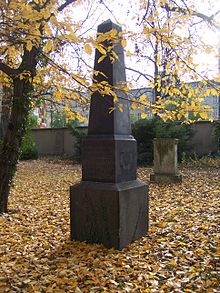Hermann Joseph
Hermann Gottlob Joseph (born December 6, 1811 in Lucka ; † March 7, 1869 in Leipzig ) was a German lawyer and liberal politician. He was a member of the Frankfurt National Assembly and President of the First Chamber in the Saxon state parliament .
Live and act

The son of a landowner from Lucka studied after school at the Gymnasium in Altenburg at the University of Leipzig from 1829 to 1832 Law , where he received his doctorate. While still a student, he developed a political commitment by campaigning for the liberal nation -state. He was one of the co-founders of the Leipzig fraternity, Germania , which had previously been broken up in 1819 and which experienced an upswing in the revolutionary year of 1830 . In 1835 a judicial investigation was initiated against him and 18 other Leipzig fraternity members (including Adolf Ernst Hensel ). In the first instance a judgment was made to the disadvantage of the accused fraternity members. Joseph was sentenced to three years in prison. However, the imposed sentence did not have to be taken immediately, as a publication of the course of the process and the verdict as well as an intervention by the II. Landtag Chamber prevented this. In the proceedings before the Dresden Higher Appeal Court , which ended in an acquittal, he appeared as defense counsel alongside Wilhelm Schaffrath, who later became President of the State Parliament .
In 1837 he bought an estate in Lindenau near Leipzig. In October 1838 he settled as a lawyer in the neighboring trade fair city. In a by-election in 1845 he succeeded in entering the second chamber of the Saxon state parliament in the 1st rural constituency . With the words " Radical is the one who is what he does, wholeheartedly and wholeheartedly, and what he wants, wholly from the root, from the radix of the heart " he confessed in 1846 in a debate about the prohibition of as a radical democratic Saxon Fatherland papers on radicalism. As a consequence of his conclusion "Everyone who is truly liberal [must] also be radical-liberal" , he was the only Saxon parliamentarian who was not taken into account by the ministers when inviting people to social events. His contemporary Bernhard Hirschel counted him among the unquestionably liberal MPs.
In the spring of the revolutionary year 1848 he became a member of the Central Committee of the Fatherland Associations . In 1848 he was a member of the preliminary parliament . Since May 1848 he also represented the Freiberg constituency in the Paulskirchenparliament in Frankfurt , where he joined the democratic group Donnersberg . He stayed in the National Assembly until January 11, 1849, after which he gave up his mandate because he was elected as a member of the 50th, 51st and 52nd electoral districts in the first chamber of the regional parliament in December 1848. In the newly elected state parliament, the Democrats made up the overwhelming majority of the MPs. As Chamber President, he presided over this state parliament, the main focus of which was on the introduction and strengthening of Saxon parliamentarism and the recognition of the Paulskirche constitution by the Saxon King Friedrich August II . However, this parliament was dissolved on April 28, 1849. Since he was not involved in the Dresden May uprising, he was able to resume the argument in parliament in 1849/50; The Chamber President was now Robert Georgi . This state parliament was also dissolved on June 1, 1850 and two days later the government under Ferdinand Zschinsky declared the liberalized electoral law of 1848 null and void and that of 1831 binding. Joseph refused to accept his mandate again in the second chamber of the pre-March state parliament, which had been restored like a coup. As a result, like Franz Xaver Rewitzer , his right to vote was withdrawn.
From 1859 until his death he was still a city councilor in Leipzig. In 1862 he was elected to the board of the left-liberal German National Association , which after 1849 became the pool for a large number of opposition members of the National Assembly.
Honors
A street is named after him in the Leipzig district of Lindenau.
Fonts
- Presentation of the Landtag members Joseph and Schaffrath to the King , Leipzig 1848.
literature
- Helge Dvorak: Biographical Lexicon of the German Burschenschaft. Volume I: Politicians. Volume 3: I-L. Winter, Heidelberg 1999, ISBN 3-8253-0865-0 , pp. 30-31.
- Bernhard Hirschel, Saxony's government, estates and people , Mannheim 1846, pp. 74–88. ( Digitized version )
- Josef Matzerath : Aspects of Saxon State Parliament History - Presidents and Members of Parliament from 1833 to 1952 , Dresden 2001, p. 19f.
- Josef Matzerath: Joseph, Hermann Gottlob . In: Institute for Saxon History and Folklore (Ed.): Saxon Biography .
- Sebastian Schermaul: The trial against the Leipzig fraternity 1835-38 - Adolf Ernst Hensel, Hermann Joseph, Wilhelm Michael Schaffrath and their work , Peter Lang, Frankfurt a. M. 2015, ISBN 978-3-631-66259-5 .
Individual evidence
- ↑ Federal Archives: Members of the Pre-Parliament and the Fifties Committee (PDF file; 79 kB)
| personal data | |
|---|---|
| SURNAME | Joseph, Hermann |
| ALTERNATIVE NAMES | Joseph, Hermann Gottlob (full name) |
| BRIEF DESCRIPTION | German lawyer and liberal politician |
| DATE OF BIRTH | December 6, 1811 |
| PLACE OF BIRTH | Lucka |
| DATE OF DEATH | March 7, 1869 |
| Place of death | Leipzig |

